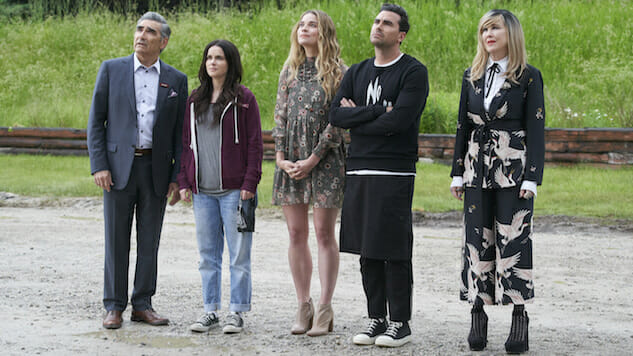
At first glance, the 2019 Emmy nominations don’t look all that bad. Who can argue with the plethora of Chernobyl, Better Call Saul, and Killing Eve? Clearly, Emmy voters took into account our Best TV Shows of 2019 list. There are a lot of phoned-in selections (Ozark, This Is Us), but they aren’t necessarily bad (though you could make an argument they are). And yet, so many of this year’s picks just aren’t particularly inspiring, and the lack of connection between the big category series nominations and acting nominations is oddly out of joint.
When it comes to surprises, the main standout is Pop’s delightful Schitt’s Creek, which everyone evidently caught up with on Netflix in the last year and came ready to vote for. And while the Fleabag nominations may not be surprising (because they’re so deserved), they’re still encouraging—never take Emmy nominations for granted! Especially when they ran as deep as they did: Sian Clifford for Supporting! Kristen Scott Thomas for Guest! And yet, no Andrew Scott? The Hot Priest? Now even this joy is tainted.
Overall, the comedy nominations are extremely solid. Barry’s excellent second season went deep with the nominations both in supporting acting roles as well as writing and directing. There are some nice, necessary inclusions like Betty Gilpin for GLOW (which should have probably gotten an overall nom, but it’s a tough lineup), as well as Maisel heartthrobs Luke Kirby and Rufus Sewell. YouTube Premium’s Cobra Kai even snuck in with a technical category nomination for Stunt Coordination (alongside Barry, GLOW, and Amazon’s The Tick). And Christina Applegate’s nomination in the lead for Dead to Me was another good addition.
In drama though, the most egregious inclusion is simply Game of Thrones. HBO has had the largest Emmy voting bloc for years, and it shows when Game of Thrones is nominated for every category—including, improbably, writing—taking up valuable real estate. Since it’s the series’ final season, the push for it over Succession (which was much better this year, and whose ensemble cast had much more to do) makes sense from a PR perspective. But that’s not what the awards are supposed to be about.
Real talk though, the wrong Stark brother was nominated for Lead Actor, as Richard Madden should have gotten a nod for his emotional work in Netflix’s Bodyguard over Kit Harington (who, try as he might, was the victim of horrendous writing). But that’s not the only space that Game of Thrones took up that it didn’t deserve. It’s may not be surprising that Starz’s excellent series Counterpart was overlooked for Outstanding Drama, but it is disappointing that J.K. Simmons and Olivia Williams didn’t get acting nominations. But Game of Thrones also cannibalized other, better HBO series than itself: No Suranne Jones for Gentleman Jack is an actual crime, and Stephen Dorff deserved recognition as being the surprising heart of True Detective Season Three. (I mean, that role launched a Dorffissance we didn’t know we needed).
Just when I start to feel better about little things like Succession’s Nicholas Britell getting a nomination for that defining theme song, and the incredibly intense “Nobody Is Ever Missing” was nominated for writing alongside Better Call Saul’s emotional “Winner,” I then see Dan Weiss and David Benioff nominated for writing “The Iron Throne.” Friends, there shouldn’t be anything about this that is considered ok. One of the laziest, most rushed, least-satisfying conclusions of a series … I have to stop myself or I’ll go on and on forever. I will, however controversially, defend Miguel Sapochnik’s directing nomination for “The Long Night,” and episode that was maligned at the time by those who said it was too dark to see (plus that whole “Arya flies out of nowhere moment”). Nevertheless, the tension and choreography and rhythm to that episode is worthy of celebration.
When it comes to the Limited Series categories, like Comedy, it’s hard to find much fault (Chernobyl! Sharp Objects! When They See Us!). It’s a stacked category from top to bottom, which just goes to show how Drama—the category that used to so dominate both awards chatter and our collective consciousness—needs to suddenly find its place among innovative, robust half-house series (that are by default considered comedies, like Russian Doll) and star-studded, expensive, and satisfying miniseries.
Network-wise, it’s also interesting what a small presence Hulu had this year (Handmaid’s Tale—the first streaming original series to win a Best Drama Emmy—was not eligible for the major categories), especially with high-profile series like George Clooney’s adaptation of Catch-22, which more or less flopped (the series did get two nominations in technical categories). Amazon, meanwhile, really swept up with Maisel, Fleabag and A Very English Scandal. Starz was, per usual, overlooked, as was CBS All Access with The Good Fight. But seeing Showtime’s under-the-radar miniseries Escape at Dannemora pick up some many nominations is encouraging, especially since Patricia Arquette was (rightfully) nominated for both that series and Hulu’s compelling The Act.
Overall, these Emmy nominations are a decent snapshot of the perils of Peak TV. There are so many good series that it’s hard to find space for them all, and sometimes mediocre ones stay in your roster just because they’re familiar. It’s not an excuse for voters, but in this glut of television, investing in yet another new series can be overwhelming. The Emmys have, at least, moved away from the years-behind choices of past ceremonies. And no Emmy nomination list will ever be perfect—there’s too much choice, too many competing preferences. Given all of that (and aside from a few truly bad decisions), what we got here in 2019 ain’t too bad. And yet, Peak TV has also taught us to never settle.
Allison Keene is the TV Editor of Paste Magazine. For more television talk, pop culture chat, and general japery, you can follow her @keeneTV